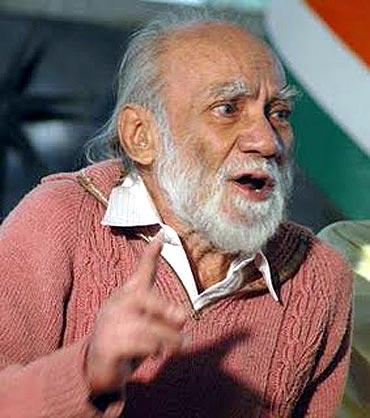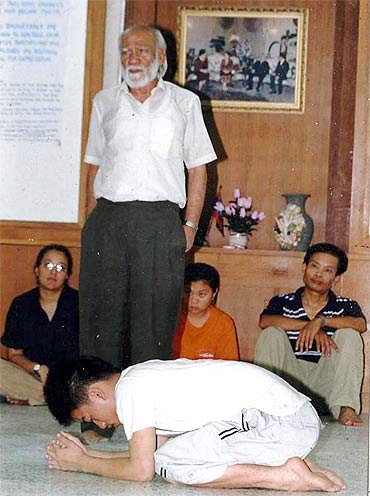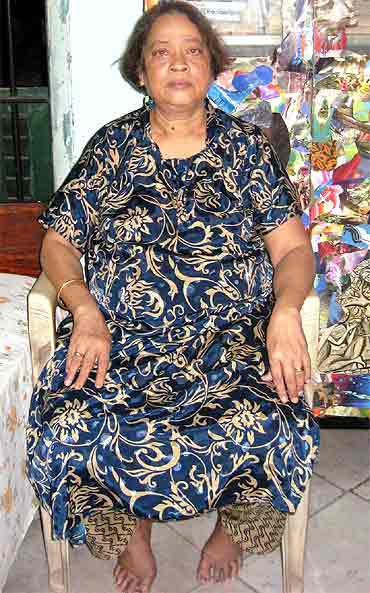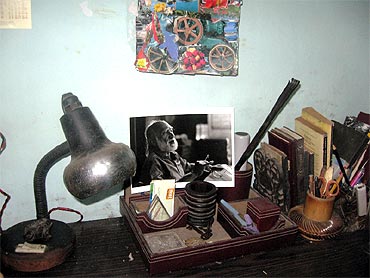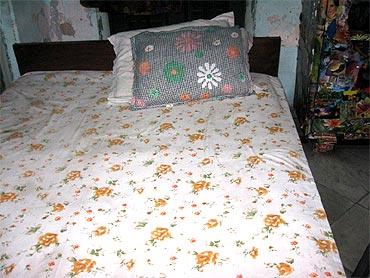 | « Back to article | Print this article |
'Being Badal Sircar's daughter isn't easy'
May 13 will be etched in the history of Bengal for two reasons: it brought to an end the 34-year-old Left Front regime in the state and it also marked the demise of Badal Sircar, one of the greatest thespians India has ever produced.
Most known for his anti-establishment plays during the Naxalite movement in the 1970s, Badal Sircar, born Suchindra Sircar in 1925, was the one who dared to take theatre out of the proscenium.
He founded his own theatre company, Shatabdi, in 1976, but it soon became inactive.
The experience set him thinking about the failure of Bengali theatre, commercial theatre, group theatre, and Yatra.
He wanted to achieve its true purpose. This led him to conceptualise what he called anganmancha or Third Theatre. In 1969 he reorganised Shatabdi.
Sircar wrote more than 50 plays of which Ebong Indrajit, Basi Khabar, and Saari Raat deserve special mention.
With his unique concept of Third Theatre, he revolutionsed street theatre in all its forms, experimented with various genres and helped the age-old norms of Bengali stage stand on their head.
He was awarded the Padma Shri in 1972, the Sangeet Natak Akademi Award in 1968 and the Sangeet Natak Akademi Fellowship-Ratna Sadsya, the highest honour in the performing arts by the Government of India, in 1997.
A lot is written about this renowned man. But how was he as a person?
Indrani Roy-Mitra visited his North Kolkata residence and caught up with his daughter Bharati Chatterjee. Excerpts from the exclusive conversation:
I was not too close to my father, neither was I detached from him. But I always felt a little uncomfortable being identified as 'Badal Sircar's daughter'. I felt it would affect my individuality.
On many occasions, either I concealed my identity or snapped ties with those who put undue stress on my 'pedigree'.
I did not want to live under his shadow. Rather, I wanted to have a career of my own. I started off as a secretary, a job that Baba never approved of. However, when I joined HMV, he was quite happy.
'He was unconventional to the core'
Baba was far ahead of his age. Just as it is impossible to pin down a cloud, it was impossible to gauge his mind. He was a class apart.
It was not easy in his times to break free of the proscenium style of theatre.
He also propagated street theatre and revolutionised the very form by deciding that the characters of the play would be attired the same way as the audience.
He was a man of grit and integrity and had nerves of steel.
Though he was offered the Padma Bhushan by the Government of India in 2010, he declined it, his logic being: he was already a Sahitya Akademi Fellow, the highest recognition for any writer.
He always preferred to take the path less travelled and came up with a strange yet the most effective decision.
'Not an ideal father, but a great husband'
He was a legendary figure in the world of theatre but I would be lying if I say he was an ideal father.
However, as a husband, he was everything a wife could ask for.
Baba was extremely committed, sincere and respectful of Ma. They were just made for each other.
As their children, neither Dada nor I ever heard any altercation between them. They had tremendous patience and understanding.
'He was apathetic towards Christianity and religion as such'
He was the son of a church's elder and we were Christians (by default). But Baba was absolutely nonchalant about religion.
He never practised Christianity, nor did he impose any strictures on any of us. We were free to do whatever we wanted.
He was an iconoclast, to be precise -- the odd one out.
When I married a Hindu, one of the oldest of his proteges, he did not object about the religious mismatch between us but about the fact that both of us quit theatre post marriage.
My would-be-in-laws, who were Hindu Brahmins from a suburban town, had imposed a precondition on me that I would need to quit the stage to marry their son.
I conceded and in solidarity, my husband too followed suit. Baba did not like two of his 'oldest theatre disciples' quitting the stage.
'From Chakra to Shatabdi'
Initially, Baba asked his friends to come over for informal adda over tea every Saturday evening at our place. This milieu, he named Chakra.
There he and his friends would play indoor games, conceptualised by Baba. They would chit-chat and discuss anything and everything under the sun.
But soon, they ran out of ideas. And to keep the spirit of adda alive, they thought of making plays.
Since theatre was a passion with Baba, he started scripting. This is how Shatabdi was born and the seeds of a revolution were sown.
'Baba was far ahead of his age'
Theatre came as naturally to him as breathing.
His Third Theatre movement was not only an experimentation. It was Baba's attempt to reach out to the masses -- his medium to converse with the people.
He took Shatabdi to as far as the interiors of Manipur.
When in the 1970s, Shatabdi started performing potent, anti-establishment plays at Curzon Park (in Central Kolkata), some of these open-air shows managed to ruffle quite a few feathers. But Baba was unfazed.
'He was often misunderstood'
Baba was convinced that theatre had to break the barriers between performer and spectator, performer and performer, spectator and spectator.
Theatre, to him, was a collective exercise to awaken and enhance the social consciousness of participants.
He was also keen on breaking the urban and rural divide. He wanted and achieved the involvement of villagers among whom he lived while writing and producing a few of his plays.
Baba was determined to end the concept of theatre's ticket sales. Rather, he wanted to rely only on voluntary donations from the audience. He was a man far ahead of his age.
Naturally, therefore, he became alienated from his contemporaries. He lived a solitary life, confined in his world of thoughts, a genius grossly misunderstood.
'He was dynamic till his last breath'
However, nothing could affect his mental vigour. Even in his illness, he ate, drank and slept theatre. The latter kept his spirit alive till death took him away from this world.
He would ask me to read out a few plays to him while lying in bed or would urge me to translate a few of his plays into English.
In fact, often he would himself translate and dictate to me several paragraphs.
I used to be awestruck by Baba's energy level, I wish I am as strong as him in my last days.
'I am re-living him now'
Baba is no more. The cot where he spent his final moments looks painfully vacant now. An emptiness surrounds me all the time.
But instead of shedding tears, I have decided to take a leaf out of Baba's book. I am arranging his pictures, works, plays, collages.
I am browsing through the past. I am feasting on some wonderful memories.
I am re-living Badal Sircar the great, I am embracing my dear Baba.
